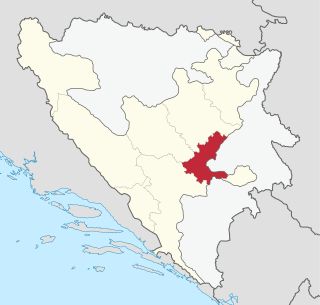
Bosnia and Herzegovina, abbreviated BiH or B&H, sometimes called Bosnia–Herzegovina and often known informally as Bosnia, is a country in Southeastern Europe, located in the Balkans. Bosnia and Herzegovina borders Serbia to the east, Montenegro to the southeast, and Croatia to the north and southwest. In the south it has a narrow coast on the Adriatic Sea within the Mediterranean, which is about 20 kilometres long and surrounds the town of Neum. Bosnia, which is the inland region of the country, has a moderate continental climate with hot summers and cold, snowy winters. In the central and eastern regions of the country, the geography is mountainous, in the northwest it is moderately hilly, and in the northeast it is predominantly flat. Herzegovina, which is the smaller, southern region of the country, has a Mediterranean climate and is mostly mountainous. Sarajevo is the capital and the largest city of the country followed by Banja Luka, Tuzla and Zenica.

The economy of Bosnia and Herzegovina is a transitional, upper middle income economy. Bosnia and Herzegovina declared independence from socialist Yugoslavia on 1 March 1992. The main trading partners are Germany, Italy, Austria, Turkey and other neighboring Balkan countries.

The Armed Forces of Bosnia and Herzegovina is the official military force of Bosnia and Herzegovina. The BiH armed forces were officially unified in 2005 and are composed of two founding armies: the Bosniak-Croat Army of the Federation of Bosnia and Herzegovina (VFBiH) and the Bosnian Serbs' Army of Republika Srpska (VRS).

Sarajevo is the capital and largest city of Bosnia and Herzegovina, with a population of 275,524 in its administrative limits. The Sarajevo metropolitan area including Sarajevo Canton, East Sarajevo and nearby municipalities is home to 555,210 inhabitants. Located within the greater Sarajevo valley of Bosnia, it is surrounded by the Dinaric Alps and situated along the Miljacka River in the heart of the Balkans, a region of Southern Europe.

The Bosnian War was an international armed conflict that took place in Bosnia and Herzegovina between 1992 and 1995. The war is commonly seen as having started on 6 April 1992, following a number of earlier violent incidents. The war ended on 14 December 1995 when the Dayton accords were signed. The main belligerents were the forces of the Republic of Bosnia and Herzegovina, those of Republic of Herzeg-Bosnia and Republika Srpska, proto-states led and supplied by Croatia and Serbia, respectively.

Fudbalski klub Sarajevo is a professional football club based in Sarajevo, the capital city of Bosnia and Herzegovina and is one of the most successful clubs in the country.

The Miljacka is a river in Bosnia and Herzegovina that passes through Sarajevo. Numerous city bridges have been built to cross it.

Fudbalski klub Željezničar Sarajevo, commonly referred to as Željo, is a professional football club, based in Sarajevo, Bosnia and Herzegovina. The name Željezničar means "railway worker", originating from their establishment by a group of railway workers in 1921. Throughout its history, the club has cultivated a reputation for producing talented home-grown players through its academy.

The Sarajevo Canton, officially the Canton of Sarajevo, is one of 10 cantons of the Federation of Bosnia and Herzegovina in Bosnia and Herzegovina. Its cantonal seat is the city of Sarajevo, also the capital city of Bosnia and Herzegovina.

Sarajevo International Airport is the main international airport in Bosnia and Herzegovina, serving Sarajevo, capital of Bosnia and Herzegovina. It is located 3.3 NM southwest of the Sarajevo railway station and some 6.5 NM west of downtown Sarajevo in the Ilidža municipality, suburb of Butmir. In 2019, 1,143,680 passengers travelled through the airport, compared to 323,499 in 2001.

Sarajevo Tobacco Factory was a cigarette producer with headquarters in Sarajevo, Bosnia and Herzegovina.
B&H Airlines d.o.o. was the flag carrier of Bosnia and Herzegovina with its head office in Sarajevo. It operated scheduled and charter passenger services as well as small cargo services from its home base at Sarajevo International Airport. It ceased operating in June 2015

Lesbian, gay, bisexual, and transgender (LGBT) persons in Bosnia and Herzegovina may face legal challenges not experienced by non-LGBT residents. Both male and female same-sex sexual activity are legal in Bosnia and Herzegovina. However, households headed by same-sex couples are not eligible for the same legal protections available to opposite-sex couples.

The University of Sarajevo is a public university located in Sarajevo, Bosnia and Herzegovina. It is the largest and oldest university in the country, tracing its initial origins to 1537 as an Islamic madrasa.

The history of Jews in Bosnia and Herzegovina spans from the arrival of the first Bosnian Jews as a result of the Spanish Inquisition to the survival of the Bosnian Jews through the Holocaust and the Yugoslav Wars. Judaism and the Jewish community in Bosnia and Herzegovina has one of the oldest and most diverse histories in the former Yugoslav states, and is more than 500 years old, in terms of permanent settlement. Then a self-governing province of the Ottoman Empire, Bosnia was one of the few territories in Europe that welcomed Jews after their expulsion from Spain.
Agrokomerc is a food company headquartered in Velika Kladuša, Bosnia and Herzegovina with former operations extending across the entire area of former Yugoslavia. The company became internationally known in the late 1980s due to a corruption scandal known as the Agrokomerc Affair. During the war in Bosnia and Herzegovina, Fikret Abdić, the chief executive officer of the company, used his wealth and political influence to create the Autonomous Province of Western Bosnia, an unrecognized state.
Mirza Varešanović is a Bosnian professional football manager and former player who is the manager of Bosnian Premier League club Sarajevo.

Trams in Sarajevo are a part of the public transport system in Sarajevo, the capital city of Bosnia and Herzegovina. The system is run by KJKP GRAS Sarajevo, which also operates trolleybus and bus routes in the city.

Denis Zvizdić is a Bosnian politician who served as Chairman of the Council of Ministers of Bosnia and Herzegovina from 2015 to 2019. He is currently a member of the House of Representatives and has also served as Prime Minister of Sarajevo Canton from 2003 to 2006.

The siege of Goražde refers to engagements during the Bosnian War (1992–95) in and around the town of Goražde in eastern Bosnia.















